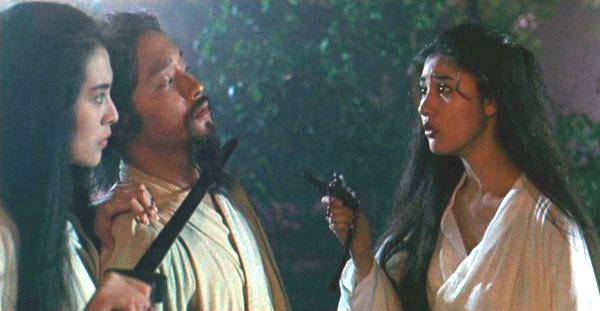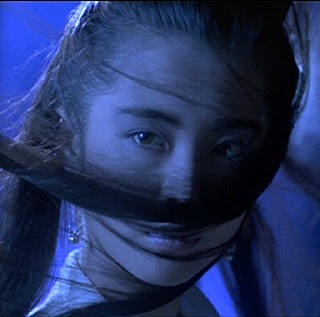Friday, November 4, 2011
THE EAST IS RED #24 – A CHINESE GHOST STORY Then and Now
by Lisa Morton
In the history of Hong Kong cinema, 1986 just may go down as the finest year ever, with three landmark films – the triad thriller A Better Tomorrow, the feminist period action extravaganza Peking Opera Blues, and the wildly kinetic A Chinese Ghost Story – released that year. Even more amazing is that all three of those films had the same producer: Tsui Hark. Tsui officially directed only one – Peking Opera Blues – but his imprimatur is certainly all over the other two; even though A Better Tomorrow was director John Woo’s breakout hit, and A Chinese Ghost Story was credited to frequent Tsui collaborator Ching Siu-tung, there’s no question that Tsui was heavily involved with the direction of both, especially Ghost Story, which became a major worldwide hit for Tsui and for Hong Kong cinema. Tsui went on to produce two sequels to A Chinese Ghost Story, and in 1997 he even produced an animated version of the tale.
Like many other Hong Kong fantasy films, A Chinese Ghost Story was taken from a book called Strange Stories from a Chinese Studio, a 17th-century collection of fairy tales about haunted inns and animals that become people. Many of the stories center on a young scholar who stumbles on supernatural happenings and becomes embroiled in a forbidden love affair, and Tsui kept these elements for his 1986 adaptation, adding on more horror scenes and a plot involving the young scholar’s attempts to save his ghostly love from marriage to “Lord Black”, the king of Hell. As the young government official and the tragic ghost, Tsui and Ching cast two of the most astonishingly beautiful actors in Asian cinema: The late Leslie Cheung, and Taiwanese actress Joey Wang. A moment when Wang hides Cheung underwater and lavishes a long, slow-motion kiss on him as bubbles and flower petals float past is one of the great romantic moments of all Asian cinema.
Now, in 2011, as Chinese and Hong Kong filmmakers have followed their American counterparts and begun to mine their cinematic past for remake gold, A Chinese Ghost Story has finally been reincarnated¸ although without the involvement of Tsui Hark. This time it’s director Wilson Yip at the helm, fresh off his success with the martial arts dramas Ip-man and Ip-man 2, directing unknowns Yu Shao-qun and Liu Yi-fei in the Leslie Cheung and Joey Wang roles; however, this version also throws in not one but two Taoist demon hunters, including Yan – played by popular Hong Kong leading man Louis Koo – who is also in love with the ghost girl.
This new version – which we’ll hereafter refer to as ACGS2011 – can’t help but pale by comparison to the neo-classic original, but it bears just enough resemblance to the original that fans of ACGS1986 will have a hard time letting it stand or fall on its own. It begins promisingly, with an extended flashback showing how the young Yan fell in love with the supernatural Siu Sin (who is referred to as a demon here); they finally part when he realizes that a demon-hunter and a demon can’t stay together.
Years later, a young government official, Ning, arrives to assist an isolated town suffering from a severe drought. Ning journeys with a gang of convict laborers to a mountainside temple, where he finds a well that could provide the town with water. Unfortunately, he also finds a pack of beautiful and seductive demons who murder the convicts and attack him. He barely escapes, thanks to the assistance of Siu Sin, and soon they begin to fall in love. Siu Sin reveals that she is being held captive by a thousand-year-old tree demon who is forcing lesser demons to kill for her. Things get even more complicated when Yan arrives, intent on finally killing the tree demon once and for all, and soon the other Taoist master also shows up.
If all that sounds confused and overly complicated…well, it is. Plotting is hardly the strength of either version of ACGS, but at least the Tsui/Ching original kept things moving forward quickly with a non-stop barrage of edits and images, not least of which was a night-time pursuit through a forest by a giant tongue. The new ACGS falters badly in the middle, spending far too much time on chatter instead of chills. Where the original had a delightfully spooky interlude involving Leslie narrowly escaping the clutches of stop-motion animated zombies, this one has Siu Sin and Ning hiding out in a deserted building and…well, talking. And talking. Call me shallow, but in a movie like this I’ll take goofy-looking zombies any day over the hero’s melancholic ramblings about his childhood.
There are certainly plenty of lovely images in ACGS2011, though (my favorite is a sequence in which the tree demon traps Koo in a literal sea of leaves, and he finally stops fighting and lets himself float atop the leaf-waves), and lots of nods to both the original film and other Tsui Hark movies as well (a pair of giggling snake demons are obviously an homage to Tsui’s Green Snake). The actors are all capable, if none begin to capture the luminescent star appeal of Cheung and Wang; the dependable Koo comes off best¸ making his gruff Taoist warrior both stalwart and funny (although no one could touch actor Wu Ma’s delirious drunken Taoist from the original ACGS). There are also some decent fight scenes and a few lovely sets; the score is fairly typical for a big modern Chinese historical epic these days, hardly comparable to James Wong and Romeo Diaz’s lovely songs and soundtrack from ACGS1987. Unfortunately, there’s nothing here to top the original’s final battle in Hell, but maybe the producers of ACGS2011 thought it best to simply not even try.
Overall, I’d probably only recommend the new ACGS to fans of the original, who will be entertained by the in-jokes and hat-tips (including the use of the original film’s main song). For newcomers looking to make an entry into the world of Chinese horror/fantasy films, though…trust me and stick to the original. I re-watch it every so often, and thanks in part to Tsui and Ching’s deft blending of horror, humor and romance, and the presence of the two stars, it still holds up splendidly. I wish I could say I’d be re-watching the new ACGS a quarter-of-a-century from now, but somehow it seems doubtful.
--Lisa Morton




